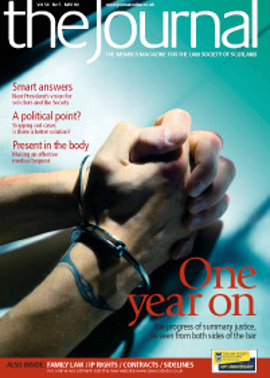Shared principles

It has been an interesting few weeks for solicitor advocates since the opinions in Woodside were issued on 18 February 2009. Not since the debates in the House of Lords in 1990, when the law creating solicitor advocates was introduced, has there been such direct criticism of the whole rationale for solicitor advocates.
I believe it is time for us to take stock. The Society of Solicitor Advocates and the Law Society of Scotland have supported the Lord Justice Clerk’s call for a review “of the working of the system overall”. Let us hope that a review takes place and that it examines robustly the professional practices of all those who appear before the higher courts. Our clients deserve nothing less.
The matters of professional practice criticised in Woodside were the instruction of solicitor advocates, seniority, self-certification of competence and mixed representation. In my opinion these criticisms are misplaced.
Instruction
The concerns expressed about instruction centre on rule 3 of the Solicitors (Scotland) (Supreme Courts) Practice Rules 2003, which requires all clients to be given the choice of advocate or solicitor advocate. Clients expect to be advised on appropriate representation. In assisting my client to choose between those two types of representation, it is suggested that I can recommend anyone but myself or one of my firm’s solicitor advocates, as that advice would not be perceived as objective.
My duty is to act only where I am competent to do so. I do not accept that the rules of conduct for solicitor advocates provide no safeguard to protect clients from inexperienced solicitor advocates whose reach exceeds their grasp. The Solicitors (Scotland) (Standards of Conduct) Practice Rules 2008 are designed to ensure that an instructing solicitor instructs a solicitor advocate or advocate of appropriate skill, specialisation and experience to the task. The provisions of rule 3 are duplicative and unnecessary. The duty to ensure competent representation provides clients with the same protection.
I also do not accept that if a solicitor advocate is instructed by his own firm, the relationship of instructing solicitor and independent pleader is purely nominal. Junior solicitors instructing senior colleagues have an equal duty to exercise independence and to take appropriate action if concerned about the representation being provided. That is what I would expect of any of my own team instructing me.
Seniority
The rules of seniority in the Faculty of Advocates relate to the time served by its members and are strictly adhered to in their lives and practice. A junior member cannot lead a more senior member. No such rules apply to solicitor advocates. Solicitor advocates may be instructed as senior or junior as the instructing solicitors consider appropriate, provided they ensure that their clients are competently and appropriately represented. Any solicitor advocate acting as senior has to accept that the role carries certain responsibilities.
Self certification
The current system of “self certification” as senior for legal aid remuneration will be brought to an end shortly. In future, the Council of the Law Society of Scotland will recommend certain solicitor advocates for remuneration as seniors for legal aid purposes. A committee chaired by Sheriff Principal Bowen and including a Council member, two members of the Society of Solicitor Advocates’ committee and a lay member will consider applications. A list of accredited senior solicitor advocates for remuneration purposes should be available by 1 September 2009.
Mixed representation
The difference in business structures between the Faculty of Advocates and solicitor advocates who practise in law firms has no bearing on the central question of independence before the court. Woodside perceives dangers where the defence in a serious trial is in the hands of two lawyers who are governed by separate codes of conduct and subject to separate disciplinary jurisdictions. However, the Law Society of Scotland and the Faculty of Advocates subscribe to the same principles of independence, trust, personal integrity and confidentiality. I do not believe that the commitment of solicitor advocates to those fundamental principles is any different to that of members of Faculty.
Choice for the client
Solicitor advocates were created to give clients an alternative: a choice of representation. Members of Faculty (who include the judiciary) cannot force us to fit the Faculty mould. If we did, where would be the choice? Criticisms which point to the differences between us are only constructive if they prompt a raising of standards across both branches of the advocacy profession and ultimately provide benefits to our clients.
In this issue
- Obama's first 100 days
- Playing politics with the Scottish constitution
- Beneficiaries are suffering from the high cost of advice
- Ever forwards
- Shared principles
- A year of debate
- Ask the audience
- Property sales continue to fall
- Where fact makes law
- Giving up the body
- Playing politics with the constitution
- Matrix evolutions
- Make it happen
- View from the top
- Retiring thoughts
- Law reform update
- Phone a friend
- Lighting the way
- Is Big Brother watching too closely?
- Ask Ash
- Selection, the professional way
- A claims pandemic?
- Bumper crop
- A place in the sun?
- Equality redefined
- Taking diligence forward
- Scottish Solicitors' Discipline Tribunal
- Book reviews
- Website review






